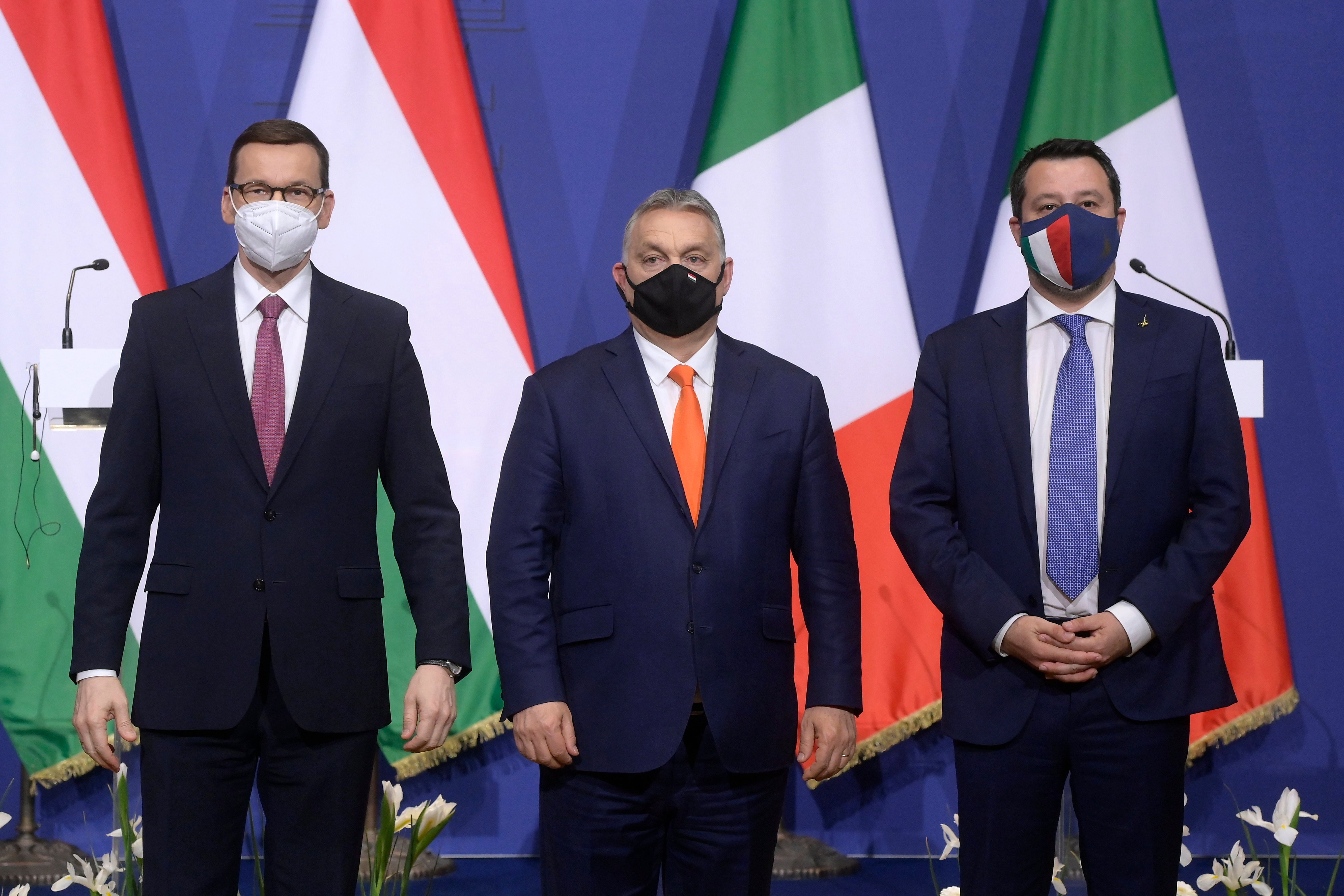Populist leaders meet, seek 'European renaissance'
Hungarian Prime Minister Viktor Orban has hosted talks with populist politicians from Italy and Poland as they sought to create a new right-wing political force on the European stage

Your support helps us to tell the story
From reproductive rights to climate change to Big Tech, The Independent is on the ground when the story is developing. Whether it's investigating the financials of Elon Musk's pro-Trump PAC or producing our latest documentary, 'The A Word', which shines a light on the American women fighting for reproductive rights, we know how important it is to parse out the facts from the messaging.
At such a critical moment in US history, we need reporters on the ground. Your donation allows us to keep sending journalists to speak to both sides of the story.
The Independent is trusted by Americans across the entire political spectrum. And unlike many other quality news outlets, we choose not to lock Americans out of our reporting and analysis with paywalls. We believe quality journalism should be available to everyone, paid for by those who can afford it.
Your support makes all the difference.Hungarian Prime Minister Viktor Orban hosted talks Thursday with populist politicians from Italy and Poland in a bid to create a new right-wing nationalist political force on the European stage.
The trilateral meeting brought Polish Prime Minister Mateusz Morawiecki and Italy's former interior minister, Matteo Salvini to Hungary's capital of Budapest. At a press briefing following the talks, the politicians vowed to continue their cooperation in pursuit of what Orban called a “European renaissance,” but offered few details on the nature of the alliance.
The event came two weeks after Orban’s ruling Fidesz party finalized a break with its center-right European political family, the European People’s Party (EPP). That brought an end to years of conflict over Hungary’s adherence to democratic norms and Orban's construction of what he calls an “illiberal democracy.”
Since his party now is without a caucus in the European Parliament, Orban has signaled he hopes to “reorganize the European right wing" and find a home in Brussels for Hungarian lawmakers and other anti-immigration parties.
“We came together to plan and speak about the future of Europe,“ Orban said. ”As Mr. Salvini put it, and we all agreed, we want a European renaissance ... Many millions of European citizens have been left without adequate and effective representation."
Salvini, who shares Orban’s firm opposition to immigration, heads Italy's League, the largest party of the far-right Identity and Democracy (ID) group in the European Parliament. As Salvini noted earlier, if the group were to merge with the eurosceptic European Conservatives and Reformists (ECR) — which contains Poland's ruling Law and Justice (PiS) party — that would be the parliament's second-largest bloc after the powerful EPP.
Salvini, who has expressed hopes for such a merger, called the meeting “historic” and noted the symbolism of it falling on Holy Thursday.
“We’re working so that the people of Europe can leave the darkest moment of the post-war era, putting at the center hope, family, work, rights, liberties,” he said. “After the drama (of COVID-19), let there be a renaissance, a resurrection.”
But a grand coalition of right-wing forces in Europe faces numerous obstacles stemming from political differences among its potential members, said Daniel Hegedus, a fellow for Central Europe at the German Marshall Fund.
“A wholesale merger between ID and ECR is unfeasible, there are too many inconsistencies and conflicts,” Hegedus told The Associated Press.
One conflict is the right-wing parties' different approaches to relations with Moscow. As Italy's interior minister, Salvini worked to ease EU sanctions on Russia. He was also implicated in an investigation by Rome prosecutors after an allegation that an associate sought Russian money for his League party, charges that Salvini denies.
Other members of ID, such as France's National Rally under Marine Le Pen, also maintain close ties with Moscow.
But such links could be a sticking point for Poland's ruling party led by deputy prime minister Jaroslaw Kaczynski, who supported Ukraine’s European integration efforts and helped push for EU sanctions against Russia over its 2014 annexation of Crimea.
“Kaczynski going to bed with Salvini could make it very difficult for (the ruling party) in Poland,” Hegedus said.
The leader of Poland’s opposition Civic Platform party, Borys Budka, said in Warsaw on Wednesday that Morawiecki is “implementing Putin’s policy” by meeting with Orban and Salvini, and commented that “champagne corks may pop in the Kremlin” over the gathering.
But Poland's ruling party shares Fidesz's disaffection with the EU, with both parties arguing Brussels has infringed on their sovereign decisions. The conflict with the bloc came to a head late last year, when Hungary and Poland vetoed the bloc's seven-year budget and coronavirus recovery package over provisions that tied the payment of EU funds to following the rule of law.
On Thursday, Morawiecki echoed Orban's calls for a European political force that “respects national sovereignty and freedom" and defends traditional values.
Despite the political affinities between governments in Warsaw and Budapest, Poland's ruling party holds the strongest position in the ECR, Hegedus said, and leaving that group would not serve its political interests.
“Practically all parties are just playing to demonstrate that they are important on the European stage and have important partners," he said. "The only person who is in a hurry is Orban because he is out in the cold.”
Orban said the politicians would meet again in May, most likely in Warsaw.
___
Associated Press writers Monika Scislowska in Warsaw and Nicole Winfield in Rome contributed.